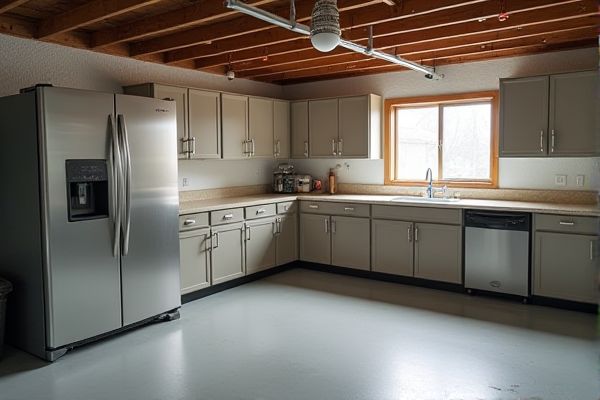
Choosing between a garage freezer and a basement freezer depends on your climate and space conditions, as garage freezers face temperature fluctuations while basement freezers benefit from stable, cooler environments. Discover which option best preserves your food and suits your home by reading the rest of this article.
Table of Comparison
| Feature | Garage Freezer | Basement Freezer |
|---|---|---|
| Temperature Stability | Variable; affected by outdoor weather extremes | More stable; insulated from temperature fluctuations |
| Energy Efficiency | Lower; compressor runs more to maintain temperature | Higher; consistent cooler environment reduces energy use |
| Freezer Longevity | Potentially shorter due to temperature swings | Longer lifespan from steady operating conditions |
| Installation Convenience | Easy access, near driveway or vehicle storage | May require basement access; can be less convenient |
| Climate Impact | More impact from seasonal temperature extremes | Less affected due to underground location |
Overview: Garage Freezer vs Basement Freezer
Garage freezers are designed to withstand wider temperature fluctuations and typically feature more robust insulation and temperature control systems, making them ideal for unheated or semi-exposed spaces. Basement freezers, often in more stable, cooler environments, tend to operate more efficiently due to consistent ambient temperatures, resulting in lower energy consumption. Choosing between a garage freezer and a basement freezer depends on insulation quality, ambient temperature stability, and energy efficiency requirements.
Temperature Fluctuations and Performance
Garage freezers are more susceptible to temperature fluctuations due to exposure to external weather conditions, which can impact their performance and energy efficiency compared to basement freezers. Basement freezers benefit from a more stable and cooler ambient temperature, resulting in consistent performance and reduced risk of freezer burnout or temperature spikes. Manufacturers often recommend specially designed outdoor or garage-rated freezers to maintain optimal freezing conditions in variable environments.
Energy Efficiency in Different Locations
Garage freezers often experience temperature fluctuations that cause compressors to work harder, reducing energy efficiency compared to basement freezers, which typically benefit from more stable, cooler temperatures. Energy consumption in garage freezers can increase by up to 20-30% due to exposure to higher ambient temperatures, especially in summer months. Basement freezers maintain consistent cool conditions, minimizing compressor cycling and leading to lower electricity bills and a longer lifespan for the appliance.
Space and Accessibility Considerations
Garage freezers often provide larger storage capacity due to the ample space available, making them ideal for bulk storage and seasonal items. Basement freezers typically offer easier accessibility year-round, as they are protected from extreme temperature fluctuations, ensuring more consistent performance. Choosing between the two depends on balancing the need for extra space in the garage against the convenience of the basement location.
Impact of Humidity and Moisture
Garage freezers face higher humidity and moisture levels compared to basement freezers, increasing the risk of rust and compressor damage. Basements generally provide a more stable, dry environment, reducing condensation buildup that can impair freezer efficiency. You should consider moisture control solutions if placing a freezer in a humid garage to protect its longevity and performance.
Installation Requirements and Challenges
Garage freezers require careful consideration of temperature fluctuations and insulation to maintain optimal performance, as extreme cold or heat can affect compressor efficiency. Basement freezers generally benefit from more stable temperatures but may face humidity-related issues that necessitate proper ventilation and moisture control. Both installations must ensure level flooring and easy access to electrical outlets to avoid operational challenges and potential damage.
Long-term Durability and Maintenance
Garage freezers require models with robust insulation and temperature regulation to withstand fluctuating outdoor temperatures, ensuring long-term durability. Basement freezers tend to have a more stable environment, reducing the risk of temperature-related mechanical wear and lowering maintenance needs. Selecting the right location for your freezer can significantly impact its lifespan and the frequency of upkeep.
Noise Levels and Household Disturbance
Garage freezers typically produce more noise due to fluctuating temperatures causing the compressor to work harder, which can lead to increased household disturbance if adjacent to living spaces. Basement freezers benefit from more stable temperatures, resulting in quieter operation and less impact on the household environment. Choosing a basement freezer minimizes noise levels, making it better suited for maintaining a peaceful home atmosphere.
Cost Differences and Value Analysis
Garage freezers typically incur higher energy costs due to temperature fluctuations requiring more frequent compressor cycles, whereas basement freezers benefit from more stable temperatures, leading to lower electricity consumption and operational expenses. Initial purchase prices vary slightly, but the long-term value heavily depends on the freezer's location and insulation quality, with basement freezers offering better preservation and less maintenance over time. Evaluating cost differences alongside energy efficiency and durability factors reveals that basement freezers generally provide superior value despite similar upfront investments.
Best Freezer Types for Garage or Basement Use
Chest freezers are ideal for garages and basements due to their superior insulation and ability to maintain consistent temperatures in fluctuating environments. Upright freezers offer convenient access and organization but may require more energy to operate effectively in non-climate-controlled spaces. Models designed with enhanced insulation and cold-resistant compressors are best suited for installation in areas like garages or basements with variable temperature conditions.
 homyna.com
homyna.com